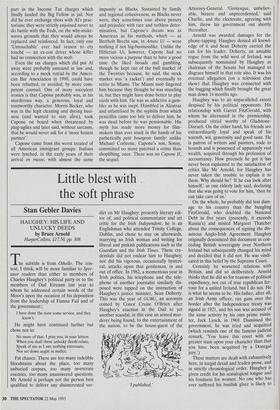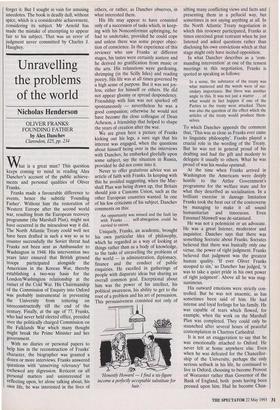Little blest with , the soft phrase
Stan Gebler Davies
HAUGHEY: HIS LIFE AND UNLUCKY DEEDS by Bruce Arnold HarperCollins, £17.50, pp. 308 The subtitle is from Othello. The con- text, I think, will be more familiar to Spec- tator readers than either to members of Charles Haughey's political party or to the members of Dail Eireann last year to whom he addressed certain words of the Moor's upon the occasion of his deposition from the leadership of Fianna Fail and of the government:;
I have done the state some service, and they know't.
He might have continued further but chose not to: No more of that I pray you, in your letters When you shall these unlucky deeds relate, Speak of me as I am; nothing extenuate, Nor set down aught in malice.
Fat chance. There are too many indelible bloodstains about the place, too many unburied corpses, too many inveterate enemies, too many unanswered questions. Mr Arnold is perhaps not the person best qualified to deliver any disinterested ver- diet on Mr Haughey; presently literary edi- tor of, and political commentator and art critic for the Irish Independent, he is an Englishman who attended Trinity College, Dublin, and chose to stay on afterwards, marrying an Irish woman and writing for liberal and pinkish publications such as the Guardian and the Irish Times. These cre- dentials did not endear him to Haughey; nor did his vigorous, occasionally hysteri- cal, attacks upon that gentleman, in and out of office. In 1982, a momentous year in Irish politics, his telephone and the tele- phone of another journalist similarly dis- posed were tapped on the instruction of Haughey's justice minister, Sean Doherty. This was the year of GUBU, an acronym coined by Conor Cruise O'Brien after Haughey's reaction in the Dail to yet another scandal, in this case an armed mur- derer being found, to the entertainment of the nation, to be the house-guest of the I published.' Attorney-General. 'Grotesque, unbeliev- able, bizarre and unprecedented,' said Charlie, and the electorate, agreeing with him, threw his government out shortly thereafter.
Arnold was awarded damages for the phone-tapping. Haughey denied all knowl- edge of it and Sean Doherty carried the can for his leader. Doherty, an amiable rogue from the wild west of Ireland, was subsequently nominated by Haughey as chairman of the Senate but managed to disgrace himself in that role also. It was his eventual allegation (on a television chat show) that Haughey was connected with the bugging which finally brought the great man down 14 months ago.
Haughey was to an unparalleled extent despised by his political opponents. His relationship with Garret FitzGerald, with whom he alternated in the premiership, produced vitriol worthy of Gladstone- Disraeli. On the other hand, his friends are extraordinarily loyal and speak of his warmth, wit, generosity and good taste. He is patron of writers and painters, rode to hounds and is possessed of apparently vast wealth, acquired through his profession of accountancy. How precisely he got it has never been explained to the satisfaction of critics like Mr Arnold, for Haughey has never taken the trouble to explain it to them. Why should he? 'If he can look after himself,' as one elderly lady said, declaring that she was going to vote for him, 'then he can take care of us.'
On the whole, he probably did less dam- age to his country than the bungling FitzGerald, who doubled the National Debt in five years (presently, it exceeds Russia's) and misled Margaret Thatcher about the consequences of signing the dis- astrous Anglo-Irish Agreement. Haughey originally denounced this document as con- ceding British sovereignty over Northern Ireland but subsequently changed his mind and decided that it did not. He was vindi- cated in this belief by the Supreme Court.
Certainly he worsened relations with Britain, and did so deliberately. Arnold thinks that he did so for reasons of political expediency, not out of true republican fer- vour for a united Ireland, but I do not. He is what he seems to be. His father, after all, an Irish Army officer, ran guns over the border after the Independence treaty was signed in 1921, and his son was accused of the same activity by his own prime minis- ter, Jack Lynch, in 1969. Dismissed the government, he was tried and acquitted (which reminds one of the famous judicial remark, 'You leave this court with no greater stain upon your character than that you have been acquitted by a Donegal jury.')
These matters are dealt with exhaustively here, in turgid detail and leaden prose, and in strictly chronological order. Haughey is given credit for his scatalogical tongue and his fondness for women. No one who has ever suffered his basilisk glare is likely to forget it. But I sought in vain for amusing anecdotes. The book is deadly dull, without spice, which is a considerable achievement, considering its subject. Mr Arnold has made the mistake of attempting to appear fair to his subject. That was an error of judgment never committed by Charles J. Haughey.



















































 Previous page
Previous page